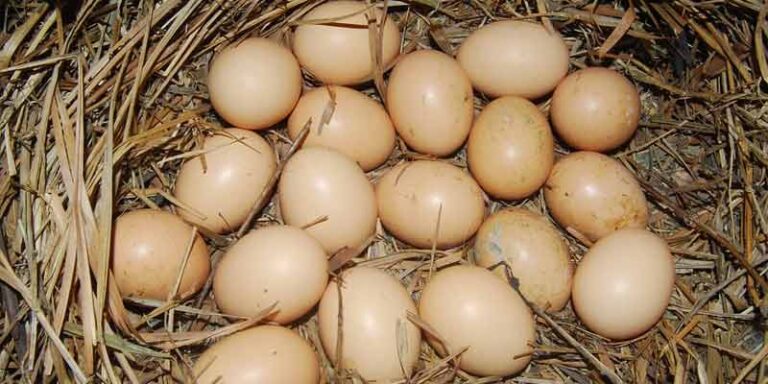Backyard chicken eggs are safe to eat. The inside of the eggs is protected by an outer ‘bloom’. This keeps foreign matters from penetrating the eggs. When handling the eggs, it’s important to wash your hands thoroughly to avoid cross-contamination in the kitchen.
Can You Get Sick By Eating Fresh Eggs?
As with any other food that is raw, there’s a chance that you can get sick from eating it. However, the risk is the same as the eggs that are commercially farmed.
To prevent the potential for food poisoning, you should practice good hygiene. This means properly storing the eggs and cooking the eggs thoroughly. As long as this is done, the backyard eggs should make you sick.
The difference between commercial eggs and backyard eggs is how they are produced. Commercial eggs are produced in a very clinical environment.
On the other hand, backyard chickens get dirty and this can get past onto the eggs.
Due to the dirtiness of the eggs, bacteria such as salmonella and campylobacter can contaminate them.
However, this is rare for these bacteria to get passed down to humans if the eggs are cooked thoroughly.
On the other hand, if the eggs are not cooked thoroughly, or they are left to come into contact with foods that are not cooked, there’s a chance the bacteria will get past on.
How To Avoid Getting Sick From Fresh Eggs
If you have just collected the eggs, they could be dirty and contaminated with bacteria. When the eggs are cracked open, the bacteria could transfer into the inside of the eggs.
If you’re going to consume the eggs raw, the bacteria will likely cause you to get sick.
To prevent food poisoning, the eggs should be cooked thoroughly. This means cooking the eggs for about 2 minutes at 158 °F or 70°c.
After the eggs are cracked open, discard the eggshells in the garbage and wash your hands thoroughly with soap. Doing so will prevent any cross-contamination to foods that are uncooked.
Proper Eggs Storage
With fresh eggs that you’ve just collected, it’s important that you know how to handle and store them correctly.
After collecting the eggs, place them in a basket or container. Make sure to keep them separated from other foods, especially those that will be eaten raw or uncooked, such as bread.
If you’re going to keep the eggs outside the fridge, don’t wash the eggs. The blooms that covered the eggs will keep them safe from bacteria entering the eggs.
On the other hand, if the eggs are washed, you’ll need to store them in the fridge.
How To Keep Eggs Clean In The Coop
To keep the eggs clean while it’s in the coop is to prevent them from becoming too dirty in the first place.
Keeping the eggs squeaky clean will be impossible since the chicken will get their feet dirty.
Below are the best ways to keep the eggs clean while it’s in the coop:
Clean nest boxes – If your chickens sleep and poop in the nest boxes, you’ll have to clean them often. You can simply remove the top layer of the straw and replace them with clean straws.
Keep chicken feet clean – If it’s rainy, the flooring of the coop will become dirty as the chicken go in and out. They’ll carry the mud on their feet into the nest as well. Place wood chips outside the coop to prevent muddy feet.
Collect eggs regularly – Try to collect the eggs on a regular basis to prevent them from getting dirty. The longer the eggs are in the nest, the higher the chance the eggs will get dirty.
Keep roosting bars away from nest boxes – When chickens are roosting, they will poop often. Make sure the nesting area isn’t directly under or close to where the chickens are roosting.
Should You Wash Eggs?
After collecting the eggs, you may be tempted to wash the eggs before storing them. However, it will depend on where you will be storing them.
When washing the eggs, it will push the bacteria into them. This is due to the eggs being porous.
Therefore, if you’re going to store the eggs at room temperature, it’s best to not wash the eggs at all. The bloom that covers the eggshell does a good job of protecting the eggs from bacteria and dirt from entering the inside of the egg.
When you’re ready to cook or use the eggs, simply crack them open. Then wash your hands thoroughly with anti-bacterial soap to prevent cross-contamination.
On the other hand, if you’re going to store them in the fridge, you can wash the eggs. However, you’ll need to sterilize the eggs as well to prevent bacteria contamination.
If you’re not planning to sterilize the eggs, you don’t need to wash them before storing them in the fridge. If there is dirt on the eggs, to clean the eggs, you can use a soft brush and gently scrub them until it’s clean.
Conclusion
Backyard chickens eggs are safe to eat, only if it’s handled and stored properly. After collecting the eggs, make sure to keep them away from other foods to avoid cross-contamination. This is especially true for foods that will be eaten raw or uncooked. By practicing good hygiene, the backyard eggs should be safe to eat.


